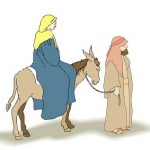As we follow the news broadcasts we are fed with so many negative stories. There appears to be very little to rejoice in these days. There is a very old song that tells us we have to accentuate the positive, and eliminate the negative.
ACCENTUATE THE POSITIVE
This seems to be what Habakkuk is telling us today.

Photo by Andre Furtado:
‘…yet I will rejoice in the LORD, I will be joyful in God my Savior.’ Habakkuk 3:18 NIV
As we noted in our last study, despite the list of possible calamities that Habakkuk envisaged, he made a determined decision not to focus on the negatives but rather to set his sights on the eternal God. “I will rejoice in the Lord.”
Matthew Henry says, ‘Praising and blessing God is work that is never out of season… Fears are silenced, sorrows sweetened, and hopes kept up.’ (Matthew Henry’s commentary on the whole Bible – Sourcebook for Speakers – Eleanor Doan – Pg. 292.)
OVERWHELMED BY CIRCUMSTANCES?
A Christian lady felt dejected because of her overwhelming troubles. As she walked along the street one day she met her pastor. He asked her how she was doing spiritually.
She replied, “Oh, not too bad, under the circumstances.”
The pastor responded, “So why are you under the circumstances? Get above the circumstances, sister – Get where Jesus is!”
- On what have you set your sights? – The circumstances? – The troubles in life – or Jesus”?
It’s not easy to rise above one’s circumstances. Like the prophet Habakkuk, we seem to have an endless list of problems to deal with.
REACTION TO CIRCUMSTANCES
There are three possible reactions to the troubles life hands us:
- you can rebel against them
- you can resign yourself to them
- Or you can rejoice in them
The choice is yours.
How do you generally react to troubling circumstances?
- Do you rebel?
- Do you resign yourself to them?
- Or do you look for a reason to rejoice in them?
OVERCOMING HARDSHIP
David experienced more than a fair share of hardship, despite being God’s chosen king of Israel.
a) Shepherd to giant killer
King Saul Israel’s first king started out well, but then his position of power went to his head and he chose to disobey God’s very clear instruction. Therefore God instructed the priest Samuel to anoint the shepherd David as the future king of Israel (1 Samuel 16:13).
During periods of deep depression, David who was also a talented musician was called upon to play soothing music to calm the king. (1 Samuel 16:21,22)
War broke out against the Philistines who had Goliath a giant of a man as their champion. The Israelites had none brave enough to take on Goliath until David volunteered and slew the giant. (1 Samuel 17)
b) Commander to fugitive
King Saul then made David his commander-in-chief of the army (1 Samuel 18:13).
Jonathan, one of King Saul’s sons, became David’s best friend. They entered into a friendship pact. (1 Samuel 20)
David’s success as a soldier and his relationship with Jonathan was the source of intense jealousy on Saul’s part. As a result, David had to flee for his life. He had to constantly change his hiding place because informers disclosed his hiding place to Saul.
On several occasions, David actually had Saul at his mercy but refused to harm God’s chosen king. (1 Samuel 24).
Samuel, the prophet, died. After his death, Saul consulted a witch to call up Samuel from the dead for advice on how to defeat the Philistines. Although the spirit of Samuel did appear he predicted Saul’s death the following day. (1 Samuel 28:3-7)
c) Chosen king but challenged
David was then anointed king of Judah and he chose Hebron as his capital. However, the nation was still divided between Israel and Judah. Israel in the north was led by Ishbosheth one of Saul’s surviving sons. (2 Samuel 2:7-12)
One of David’s generals killed Abner the general of Ishbosheth’s army (2 Samuel 3) and David was finally able to reign over all of Israel and Judah. (2 Samuel 5; 1 Chronicles 11)
However, that was not the end of David’s problems. One of his own sons, Absalom, conspired against his father. He tried to get the people to revolt against his father. (2 Samuel 14,15) During a battle against David’s forces, Absalom got caught up in a tree by his long hair. He was then killed by Joab, David’s general.
Finally, David is able to rule as God’s chosen king.
- How do you react when you know you are in the right but your actions are being challenged?
What really amazes me about this story is David’s reaction to Absalom’s death. When he was informed of his son’s death ‘David started trembling. Then he went up to the room above the city gate to cry. As he went, he kept saying, “My son Absalom! My son, my son Absalom! I wish I could have died instead of you! Absalom, my son, my son!”‘ (2 Samuel 18:33 CEV).
- How ready are you to forgive when someone has caused you deepfelt hurt?
I WILL REJOICE
This same David, who experienced such unwarranted opposition, encourages us to rejoice regardless of our circumstances.
‘God Most High, I will rejoice; I will celebrate and sing because of you.’ (Psalm 9:2 CEV)
‘May all who come to you be glad and joyful. May all who are thankful for your salvation always say, “How great is the LORD!”‘ (Psalm 40:16 GNB)
AFFLICTED YET I WILL REJOICE
When one gives serious thought to Paul’s letters they reveal that he experienced numerous circumstances which would have really overwhelmed most of us.
“Five times the Jews gave me thirty-nine lashes with a whip. Three times the Romans beat me with a big stick, and once my enemies stoned me. I have been shipwrecked three times, and I even had to spend a night and a day in the sea. During my many travels, I have been in danger from rivers, robbers, my own people, and foreigners. My life has been in danger in cities, in deserts, at sea, and with people who only pretended to be the Lord’s followers. I have worked and struggled and spent many sleepless nights. I have gone hungry and thirsty and often had nothing to eat. I have been cold from not having enough clothes to keep me warm.” (2 Corinthians 11:24-27 CEV).
Wow! This man had every reason to give up on his missionary calling. He could easily have adopted the attitude, “No Lord this is too big a burden for me to carry.”
Yet he moved above the circumstances to Jesus. He goes on to encourage all believers to ‘Rejoice in the Lord always. I will say it again: Rejoice!’ (Philippians 4:4 NIV)
Whateve trying situation you may be facting right now, take to heart the encouragement of Habakkuk, David and Paul. Decide here and now that you will ‘Rejoice in the Lord.‘ That you will ‘be joyful in God [your] Saviour.’
And now, how about clicking on the link below and join Bing Crosby and the Andrew Sisters as they encourage you to
Ac-cent-tchu-ate the positive
E-lim-i-nate the negative
And latch on to the affirmative.N.B. Scroll down to follow the words and sing along!
Have a blessed, and positive week my friends!
P.S.
If you haven’t yet read the background to the prophecy, please do. It will benefit you throughout this series of studies.
















